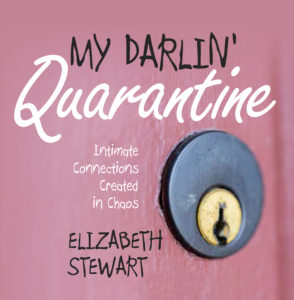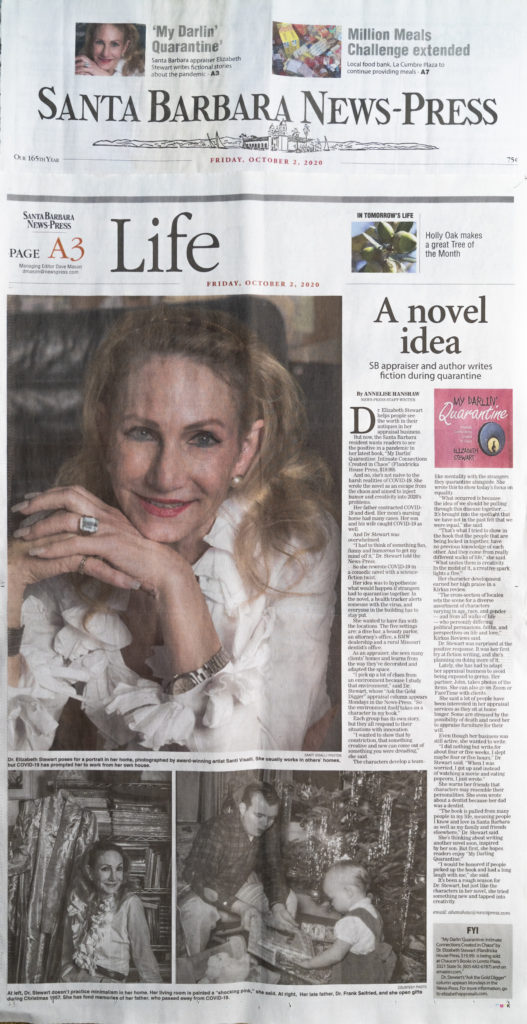“An entertaining, thought-provoking spin on rebooting the mind and heart while in quarantine.” – Kirkus Reviews
READ FULL REVIEW
 At the heart of the five comedic stories in My Darling Quarantine, the characters live out the same questions: What is the use of creativity in a crisis? How does humor open the door of quarantine? What if certain people endured quarantine as a state of suspended alienation, a time in which to invent, make, create, or write something? And what would that creation be? Who would cheer them along on the path to discover their voice?
At the heart of the five comedic stories in My Darling Quarantine, the characters live out the same questions: What is the use of creativity in a crisis? How does humor open the door of quarantine? What if certain people endured quarantine as a state of suspended alienation, a time in which to invent, make, create, or write something? And what would that creation be? Who would cheer them along on the path to discover their voice?
What if an outwardly imposed environment of constriction created an openness to new ideas and new people? Could uncomfortable, silly situations create a climate of cooperation and collaboration? What if humor in an emergency helps certain people to lighten up, and therefore find channels to ask themselves big questions, such as “How can I recreate myself?” or “What— or who—is important to me?” What if a crisis in the face of a challenging situation helped lonely characters find unlikely companionship?
In My Darling Quarantine characters endure quarantine, not with loved ones, but with complete strangers. This offers them new ways to think about themselves outside their “normal” lives with strangers with no expectations of them. Because no one knows each other, no definitions exist. The characters get to ask themselves questions: How many “essential” things and people in our normal lives were really necessary? How many “essential” things will fall away? A space in between normal and absurd offers new registers of self-discovery. Because of open-ended discoveries about themselves, as the characters move forward out of quarantine, they find a different view of their lives than they expected before quarantine. And sometimes, a new, different, unexpected future is found together with the most unlikely companion(s).
Characters in My Darling Quarantine
Vulnerability forces these characters to rethink the determinants that drove their former lives. How fragile that bubble of self-determination really is! And how amusing when we find the ability to laugh at the life we thought we led, or the person we thought we were, and the people and things we thought so important.
Restriction causes expansion for these characters, and it did for me too. My Darling Quarantine offers five comedies that emerged from the worst days of the COVID-19 pandemic, when four family members tested positive for the virus. I asked myself, “What if?” instead of “Why?”
My “what ifs” sounded like this: What if, instead of spending locked down with my partner, what if I spent locked down with strangers who were so different from my usual sphere of relationships that became forced to look at me? If no one knew me, how would I reinvent myself? How would I see myself through strange eyes? What if I was locked down with a marginal acquaintance who I never liked? What new channels might I create for friendship? Could I tolerate someone so totally different from me? What happens when a small dissimilar group of strangers experience locked down together for 42 days?
Settings
I chose five places to set my five comedies where I always felt uncomfortable: a lawyer’s office, a beauty salon, a car dealership, a dentist office, and a seedy dive bar. What if the characters, visiting these places they also disliked, were told by Powers-That-Be that they needed to stay right there, in place, for 42 days?
That’s difficult for them, amusing for us. The characters must rely on their own imaginations, which, when activated, have a miraculous way of creating a wake, and the others (those strangers) get pulled along in that wake. The characters use invention and creativity as tools to control a situation they cannot control, to channel positive energy, to get through, and then out of quarantine. The nature of invention is that one’s imagination takes control. Voila! Lock-down becomes a (strange) place for sowing creative seeds. The message is that creativity gets us out of almost everything, including out of ourselves, even in a serious situation.
When the characters in My Darling Quarantine ask, “What if,” the creative process opens up for them too. When time and space are compressed, as in quarantine, the massive power of imagination opens up.
If the world as you know it were about to end….
Would you do anything special? For 42 days, due to the second wave of the pandemic, the world completely changes for these characters. Each is faced with their past life and brings that life with them into quarantine. What makes their quarantine a challenge, on the surface of it, is other people. In the end the challenge becomes how to change themselves.
I also wanted the characters to convey hospitality—so necessary now—defined as welcoming newness in action. I wanted to explore how working together with strangers opens a door to possibilities for change when a character learns to cooperate. What is the hidden power of collaboration? If you spent locked down with strangers, how would you reinvent yourself? How would those strangers help?
What these characters bring out of their bizarre time of quarantine, in the end, results in self-discovery, a realization of who they are, what is important for them in the future, why it is fun to laugh at past mistakes, and why it is important use imagination when the world gets small. Creative imagination gets the characters to a bigger world. Once these characters’ creative imaginations are fired, inspiration leads to discoveries that lighten up their lives, both while in quarantine and after.
Two bits of business:
I mention that the Powers That Be require each character to wear a health monitor bracelet. If you’ve worn an Apple Watch and used the health monitor, these bracelets, although required by law in the story, won’t seem a strange leap of your imagination.
You might wonder why certain people have been selected, identified by the Powers That Be, as a group of possible carriers of the disease. I call these folks the R-Factotums, based on the principle in epidemiology of the R0-Factor, the reproduction number of infections possible within an infectious period. Factotum is a term in Latin meaning “important people.” I set My Darling Quarantine at the onset of a second wave of an epidemic, indeed a public health risk but not as virulent as the previous wave. They don’t expect any serious cases, but the disease vectors remain unknown. So the Powers That Be determined 1,500 possible carriers who will stay locked in place. Don’t take the prologue, a letter from the Powers That Be, seriously. The underwear line is a dead give-away!
In this characterization of the presumed carriers of a disease, I don’t make light of the seriousness of our future with COVID-19. I ask the characters, “Do you want to re-create your future? What will you do?” Then I watch what happens.
The answer is that they get busy and create something. With nothing to lose they make a new friend, create art, or re-invent a plan. During a time of suspended disorientation, they orientate themselves to a new future. They find humor in small measure, (and I make fun of them), which is a profound consolation. I think they will make you laugh too. Any obvious resemblance to anyone in particular is definitely intended.
